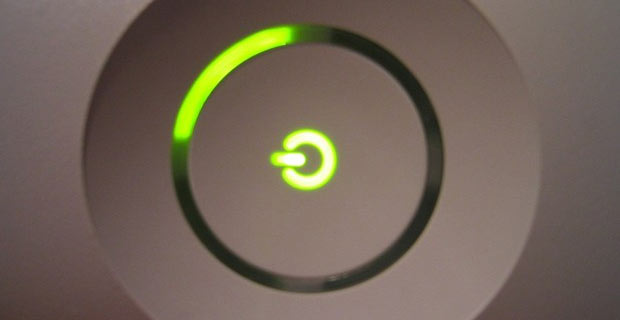I’m almost always online. I work in front of a laptop for most of my day and even when I’m away from it, my email comes through to my smartphone, which also enables my Twitter addiction, where I’m often following links to YouTube videos, funny gifs and interesting articles suggested by the people I follow. Being connected isn’t an issue for me.
I have a 100Mbps fibre optic broadband connection that often runs slightly faster than that and even at peak times doesn’t dip below around 85Mbps. I use the connection for work but I also use it for playing games and almost all of my television and movie viewing is now via streaming services. For better or worse, my internet connection is the most important single thing to the way I live my life.
But the idea that any of my devices will require a constant internet connection is a concern. Even with my super fast connection, and its perfectly reasonably uptime, the internet’s interference in my games does cause problems. Most recently, and probably most notably, this has been with SimCity.

SimCity requires a constant connection in order to be experienced in the way it was intended. It’s best to think of Maxis’ latest town-builder in similar terms to a multiplayer-only arena shooter. Everyone needs the resources on a map but certain players will develop their skills to make best use of certain ones and the most effective, successful way to play is as a team. You can play in that map on your own but you’ll be limited in what you can do and you’re likely to have much less fun as a result.
A permanent connection is important – but not integral – to the gameplay. And yet, you need to be online, even if you’re never going to interact with another person.
Despite the fact that my internet connection is better than most, and that SimCity’s developer and publisher knew that a stable internet connection was vital to my ability to play the game, it didn’t cope very well for a week after release. The US release, three days previously, had been a huge mess but even the UK’s release week saw lingering problems with server connections. That was frustrating.
My fantastic (expensive, by the way) internet connection didn’t matter because theirs wasn’t good enough and that prevented the product I’d paid £65 for (I was stupid enough to buy the Digital Deluxe edition) from working properly.
As frustrating as the situation with SimCity was, and given that my experience was not as bad as many I saw reported, I was able to put up with it with only minimal sarcastic venting. But that was one game. Imagine if every single game you bought, no matter the style or genre, had a week of not quite working properly after it launched. Imagine if every game you bought was dependant on a publicly traded company – responsible to its shareholders – keeping a roomful of expensive servers constantly running. Imagine the SimCity frustration and public outrage, amplified by every single game release.
Welcome to the world of constant, required internet connections for gaming.
Let’s, for a moment, make the incredibly generous assumption that publishers will never switch off their servers and they’ll always have enough to cope with peak demand. What happens when you move house and it takes your chosen broadband supplier three weeks to hook up your broadband? What about when you take your console with you to halls for the first year of university and WiFi blocks the ports your machine needs to play any games? What if you’re one of the thousands of console owners that works offshore or in the armed services?
Even discounting all of those cases, and that’s another incredibly generous leap to afford the notion that an always-online games console is okay, there are still too many users who just don’t have broadband access. It’s easy to assume that it’s ubiquitous because most of us move in the kind of social circles where a decent internet connection is normal but there are many households that aren’t connected – somewhere close to 25 per cent at the start of 2012 in the US.
In the UK, that figure is slightly lower but none of the traditional big console-buying regions managed anything above France’s 81% broadband connectivity.

I think a public company restricting its customer base like that is verging on irresponsible behaviour towards its shareholders, regardless of the distaste it shows for an existing customer base. Of course, you might argue that the 25 per cent who don’t have a good internet connection aren’t the kind of people who are very likely to buy a games console, and you’d probably be right.
But it’s restricting the possibility and in a world where Microsoft proudly declares its Xbox 360 as being more used for media streaming than for gaming, the market is undoubtedly shifting. Why exclude a quarter of it just because you weren’t able to attract them with your last device?
The only people who are likely to be in favour of a constant internet connection are the big publishers and that’s because of the opportunity to block or severely limit the second hand games market (and the spread of software piracy). It seems that games publishers still haven’t quite figured out that intrusive digital rights management (DRM) only really harm the publishing and distribution businesses in the long run.
DRM almost caused the total collapse of the music industry before they figured out a way to work in this newly connected world. The movie industry is still struggling with ways to handle the fact that their traditional distribution model is rapidly looking more and more dated and now the games industry seems intent on repeating similar mistakes. How bad will things have to get for them before they learn the lessons too?
Microsoft’s executives certainly aren’t doing anything to assuage the growing fears of the company’s consumers, either. Adam Orth is Microsoft Studios’ Creative Director and he recently posted the comment below via his (protected) twitter account. Apparently, he doesn’t “get the drama over having an ‘Always On’ console” but then, anyone in a leading position who thinks his customers should swallow whatever his company wants them to and just #DealWithIt obviously puts consumer welfare quite low down on his list of priorities.

It seems to me that the possibility of an always-online console is the possibility that a platform holder will choose to insult its customers and retail partners in order to placate the publishers’ unreasonable demands. A constantly connected device is most heavily rumoured around Microsoft’s next console but not completely discounted as a possibility for the PlayStation 4 either – in spite of hints made by Sony executives and assumptions made by Sony fans, there’s enough wiggle room in their statements that they could easily come down on the side of always-online.
And that would, I believe, be a big mistake.




pip
I wouldn’t put it past Microsoft to go always online with the next console. EA especially would love it; perhaps their rumoured deal has something to do with it.
fattyuk
Featured:Feature:Rumours:Internet:Lets talk and discuss about possibly nothing?:
Internet time well spent.
Alex C
Odd comment.
bunimomike
Thing is, fella, it’s an absolute deal breaker for many if this ends up being true and people are keen for Microsoft to comment and clear any ambiguities up.
blackredyellow
Good job I love my PS3.
Change is THE DEVIL!!
fattyuk
When will the article about Microsoft saying this is false be published?
Peter Chapman
Maybe, when Microsoft says anything about this is false.
We’ve seen their statement (linked in a comment below and in the earlier news story) but it’s a denial that this guy is speaking for the company, not a denial that the rumours he’s lending credence to are false. To deny that, they’d need to acknowledge that there /is/ a next xbox and they haven’t done that yet either.
So, perhaps dial back the attitude a little bit, eh?
MuggleMind
From the earlier thread, my post (in case people reading this thread missed it)…
It appears Microsoft have issued a response:
http://www.joystiq.com/2013/04/05/microsoft-responds-to-creative-directors-always-on-console-co/
However, it still doesn’t give any real answers
Roynaldo
It’s concerning for more than the reason of not everyone having internet but for people who still do yet repeatedly falls away to the point it is barely usable. (read: every Sky Broadband customer, ever)
Aran Suddi
I really don’t support the Always On future. Sure there are times I’ll play online but 90% of the time I play single player games. My internet connection is great but on occasion the router may stop or something goes wrong at the exchange meaning the net goes down. If that happens when I’m playing now I’m not affected. However if MS does implement this then I won’t be buying their next gen console.
aerobes
Adam Orth with a view of sheer ignorance. Please, release it with always on internet connection and see what happens.
Two things. A mass exodus of gamers to the competing system and a bulk delivery of party hats to Sony HQ.
quinkill
Of course it’s a bad idea! How is it at all reasonable to expect people to have an always online connection? I have two phones, a macbook pro, a PC, a Vita, a Kindle, an xbox 360 and a PS3…and I have housemates who also have their own devices running off one router. Microsoft should know better IMO.
CarBoyCam
Having a stable fibre broadband connection at home is something I’m lucky enough to have. However, internet outages, server overload etc are still a problem.
I don’t mind the idea of having to be online all the time, but on the other hand, I don’t want my game saves to be purely stored on a server and not locally. Nor do I want to be locked out of a game forever once they’ve shut down their servers.